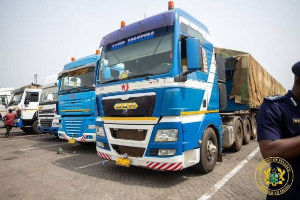If the New Patriotic Party (NPP) government, under the leadership of Nana Akufo-Addo, does not win a second term mandate, it would not be because the President did not have the best of intentions but largely because he was let down by some of his trusted men who may have their reasons for either intentionally or unintentionally taking the wrong decisions, just as is being done with the intention to hand over operations of the Ghana National Single Window (GNSW) system to a completely untried and untested company from Korea despite all the warning signals that it could completely disrupt trade and revenue flows for the country in such a critical year.
WHAT EXACTLY IS THE PROBLEM WITH UNI-PASS
The very contract itself that was signed on the blind side of Cabinet and Parliament was problematic and could cost the country several billions of cedis. For example, the termination of the UNI-PASS contract by the government either voluntarily or through material breaches occasioned by it, attracts graduated fees of between $93 million in the first year to $12m in the tenth year.
Meanwhile, Minister for Trade and Industry, Alan Kyeremanten, whose ministry awarded the contract, is yet to tell Ghanaians and relevant stakeholders, the revenue projections from implementing the UNI-PASS contract that was given on sole sourced bases for a period of 10 years.
The arrangement caused quite a major embarrassment until the Economic Management Team (EMT) had to step in to halt the process and order that it be sent to Cabinet and that the company should demonstrate it has what it takes to do the work.
IS THERE A PROBLEM WITH THE CURENT GNSW?
The current operators, GCNet and West Blue have put up an impressive record that government has boasted of and has projected Ghana as a major facilitator of trade in the sub region. Indeed, the platforms of GCNet and West Blue account for an overwhelming huge percentage of total revenue collected by the Ghana Revenue Authority (GRA).
The paperless system at the ports, under GCNet and West Blue has resulted in increased revenues for the state and yielded some 15% more in 2019 over 2018 proceeds, from GRA records, even after reducing benchmark values of 35% for imported vehicles and 50% on general goods.
HAS THE UNI-PASS SYSTEM BEEN TESTED
Though proponents of the UNI-PASS agenda argue that the company is introducing a system superior to the current one, that claim has not been demonstrated anywhere in this country; the supposed superior elements in it has not been demonstrated to the Economic Management Team, or to Cabinet, or to the Customs Division of the GRA, or to relevant stakeholders at the ports.
What is on record however is that UNI-PASS has been dragged to court over allegations it had plagiarized a portion of the existing system.
Even the current simulation exercise UNI-PASS is undergoing at parts of the country has been faced with major challenges yet its proponents insist the company is set for a smooth take off.
STAKEHOLDER CONCERNS
Relevant stakeholder groups including the Ghana Institute of Freight Forwarders (GIFF) have consistently issued statements of caution to government on the dangers UNI-PASS would bring to the volatile issue of revenue generation and trade facilitation yet the cautions have fallen on deaf ears.
Another group, IMANI, recently added its voice to the calls for UNI-PASS to be halted.
The group, in a statement addressed to Trade Minister Alan Kyeremanten, noted: “The Customs (Amendment) Act, 2016 (Act 923) amending the Principal Act clearly points the direction of where the National Single Window is ESTABLISHED, effectively curing all elements of doubt that might have lingered on in the past as to ownership of the project.
The processes leading to this outcome were recommended and executed by West Blue and the Technical Committee as part of the GNSW feasibility study. With this knowledge, why is the Trade Ministry signing agreements on this subject when a sub section of the quoted Act clearly states the Ghana Revenue Authority (GRA) as the one to manage the National Single Window System?
“In the knowledge of the Trade Facilitation Agreement that Ghana just ratified, specifically to the Article on the Disciplines on Fees and Charges, Ghana has given notification as to the number of years needed to regularize our fees and charges regime to reflect that of the WTO-TFA, why would a leading Ministry in this discussion sign a 10 year contract whose fee structure (advalorem) contravenes the stipulations of The Agreement?”
At the end of the day, it is the President’s face that would be on the ballot paper at the polls and it is his name that would be forever dragged in the mud if things go bad for this government; especially in the area of revenue generation, more so in an election year.
More soon.
Opinions of Monday, 10 February 2020
Columnist: thepublisheronline.com
Messing up Nana Addo’s govt
Entertainment














